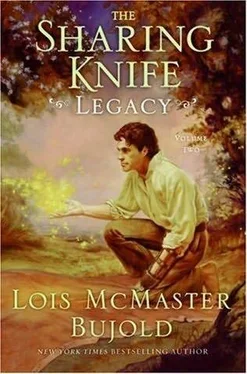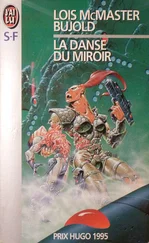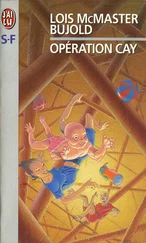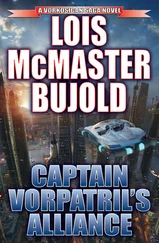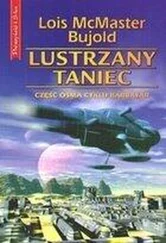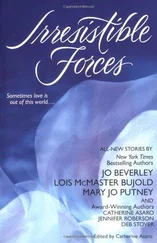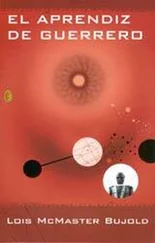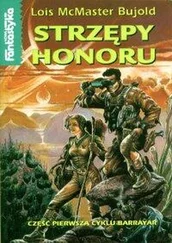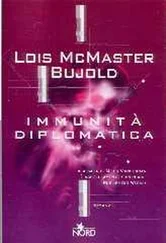It wouldn’t distract me, he thought of arguing. He settled his shoulders back on his cushion, his little burst of excitement draining away again, leaving his fatigue feeling worse by contrast. Instead, he asked, more slowly, “So why don’t we do more for farmers? No, I don’t mean the strong makers like you, you’re rare and needed here, but all of us. The patrols are out there all the time. We know and use a dozen little tricks amongst ourselves, that we could find ways to share. More than just selling plants and preparations. We could build up goodwill, over time.” He remembered Aunt Nattie’s tale of her twisted ankle. Just such a good deed had borne some fair fruit, even decades afterwards.
“Oh, Dag.” Hoharie shook her head. “Do you think no one’s tried it, tempted through pity? Or even friendship? It sounds so fine, but it only works as long as nothing goes wrong, as it inevitably must. That goodwill can turn to bad will in a heartbeat. Lakewalkers who let themselves get in over their heads trying to share such help have been beaten to death, or worse.”
“If it were…” His voice faltered. He didn’t have a counterargument for this one, as it was perfectly true. There has to be a better way was easy to say. It was a lot harder to picture exactly how.
Returning to her subject, Hoharie said, “Fairbolt doesn’t much want to give you up, but he would for this. He can see a lot of the same things I do. He’s watched you for a long time.”
“I owe Fairbolt”—Dag lifted his left arm—“everything, pretty much. My arm harness was his doing. He’d spotted something like it in Tripoint, see. A farmer artificer and a farmer bonesetter over there had got together to fix things like it for some folks who’d lost limbs in mining and forge accidents. Neither of them had a speck of groundsense, but they had ideas.”
Hoharie began to speak, but then turned her head; in a moment, Fawn popped around the tent’s open side, looking equally pleased and anxious. “Hoharie! I’m so glad you’re here. How is he doing? Mari was worried.”
As if Fawn didn’t expect her own worry to count with the medicine maker? And is she so wrong in that?
Hoharie smiled reassuringly. “He mostly needs time and rest and not to do fool things.”
Dag said plaintively, not to mention horizontally, “How can I do fool things when I can’t do anything?”
Hoharie gave his query the quelling eyebrow twitch it deserved, and went on to give Fawn a set of sensible instructions and suggestions, which added up to food, sleep, and mild camp chores when ready. Fawn listened earnestly, nodding. Dag was sure she’d remember every word. And be able to quote them back at him, likely.
Hoharie rose. “I’ll send Othan down in a couple of days to pull those stitches out.”
“I can do that myself,” said Dag.
“Well, don’t,” she returned. She glanced down at him. “Think about what I said, Dag. If your feet—or your heart—ache too much to walk another mile, you could do a world of good right here.”
“I will,” he said, unsettled. Hoharie waved and took herself out.
Frowning, Fawn flopped down on her knees beside him and ran a small hand over his brow. “Your eyebrows are all scrunched up. Are you in pain?” She smoothed away the furrows.
“No.” He caught the hand and kissed it. “Just tired, I guess.” He hesitated. “Thinkin’.”
“Is that the sort of thinkin’ where you sit like a bump for hours, and then jump sideways like a frog?”
He smiled despite himself. “Do I do that?”
“You do.”
“Well, I’m not jumping anywhere today.”
“Good.” She rewarded this resolve with a kiss, and then several more. It unlocked muscles in him that he hadn’t known were taut. One muscle, at least, remained limp, which would have disturbed him a lot more if he hadn’t been through such convalescences before. Must rest faster.
Dag spent the next three days mired in much the same glazed lassitude. He was driven from his bedroll at last not by a return of energy, but by a buildup of boredom. Out and about, he found unexpectedly intense competition for the sitting-down camp chores among the ailing—Utau, Cattagus, and himself. He watched Cattagus, moving at about the same rate he did, and wondered if this was what it was going to feel like to be old.
There being no hides to scrape at the moment, and Utau and Razi having shrewdly been first in line to help Cattagus with his elderberries, Dag defaulted to nut-cracking; he had, after all, a built-in tool for it. He was awkward at first with the fiddly aspects, but grew less so. Fawn, who plainly thought the task the most tedious in the world, wrinkled her nose, but it exactly suited Dag’s mood, not requiring any thought beyond a vague philosophical contemplation of the subtle shapes of nuts and their shells. Walnuts. And hickory shells. Over and over, very reliably. They might resist him, but only rarely did they counterattack, the hickory being the more innately vicious.
Fawn kept him company, first spinning, then working on two pairs of new riding trousers, one for him and one for her, made of cloth shared by Sarri. Sitting with him in the shade of their awning one afternoon, she remarked, “I’d make you more arrows, but everyone’s quivers are full up.”
Dag poked at a particularly intractable nutshell. “Do you like making arrows better than making trousers?”
She shrugged. “It just feels more important. Patrollers need arrows.”
He sat back and contemplated this. “And we don’t need trousers? I think you have that the wrong way round, Spark. It’s poison ivy country out there, you know. Not to mention the nettles, thistles, burrs, thorns, and bitey bugs.”
She pursed her lips as she poked her needle slowly through the sturdy cloth. “For going into a fight, though. When it counts.”
“I still don’t agree. I’d want my trousers. In fact, if I were waked up out of my bedroll in a night attack, I think I’d go for them before my boots or my bow.”
“But patrollers sleep in their trousers, in camp,” she objected. “Although not in hotels,” she allowed in a tone of pleasurable reminiscence.
“That gives you a measure of importance, then, doesn’t it?” He batted his eyes at her. “I can just picture it, a whole patrol riding out armed to the teeth, all bare-assed. Do you have any idea what the jouncing in those saddles would do to all our tender bits? We’d never make it to the malice.”
“Agh! Now I’m picturing it!’ She bent over, laughing. “Stop! I’ll allow you the trousers.”
“And I’ll thank you with all my heart,” he assured her. “And with my tender bits.” Which made her dissolve into giggles again.
He could not remember when she’d last laughed like this, which sobered him. But he still smiled as he watched her take up her sewing once more. He decided he would very much like to thank her with his tender bits, if only they would get around to reporting for duty again. He sighed and took aim at another hickory shell.
Fortunately, or unfortunately, while he was still recuperating, Fawn’s monthly came on—a bad one, it seemed, alarmingly bloody. Dag, concerned, dragged Mari over to Tent Bluefield for a consultation; she was reassuringly unimpressed, and rattled off a gruesome string of what Dag decided were the female equivalent of old-patroller stories, about Much Worse Things She Had Seen.
“I don’t recall the young women on patrol having this much trouble,” he said nervously, hovering.
Mari eyed him. “That’s because girls with these sorts of troubles gener’lly don’t choose to become patrollers.”
“Oh. Makes sense, I guess…”
Softening, Mari allowed as how Fawn was likely still healing up inside, which from the state of the scars on her neck Dag guessed to be exactly the case, and that the problems should improve over the next months, and even unbent enough to give Fawn a tiny ground reinforcement in the afflicted area.
Читать дальше
